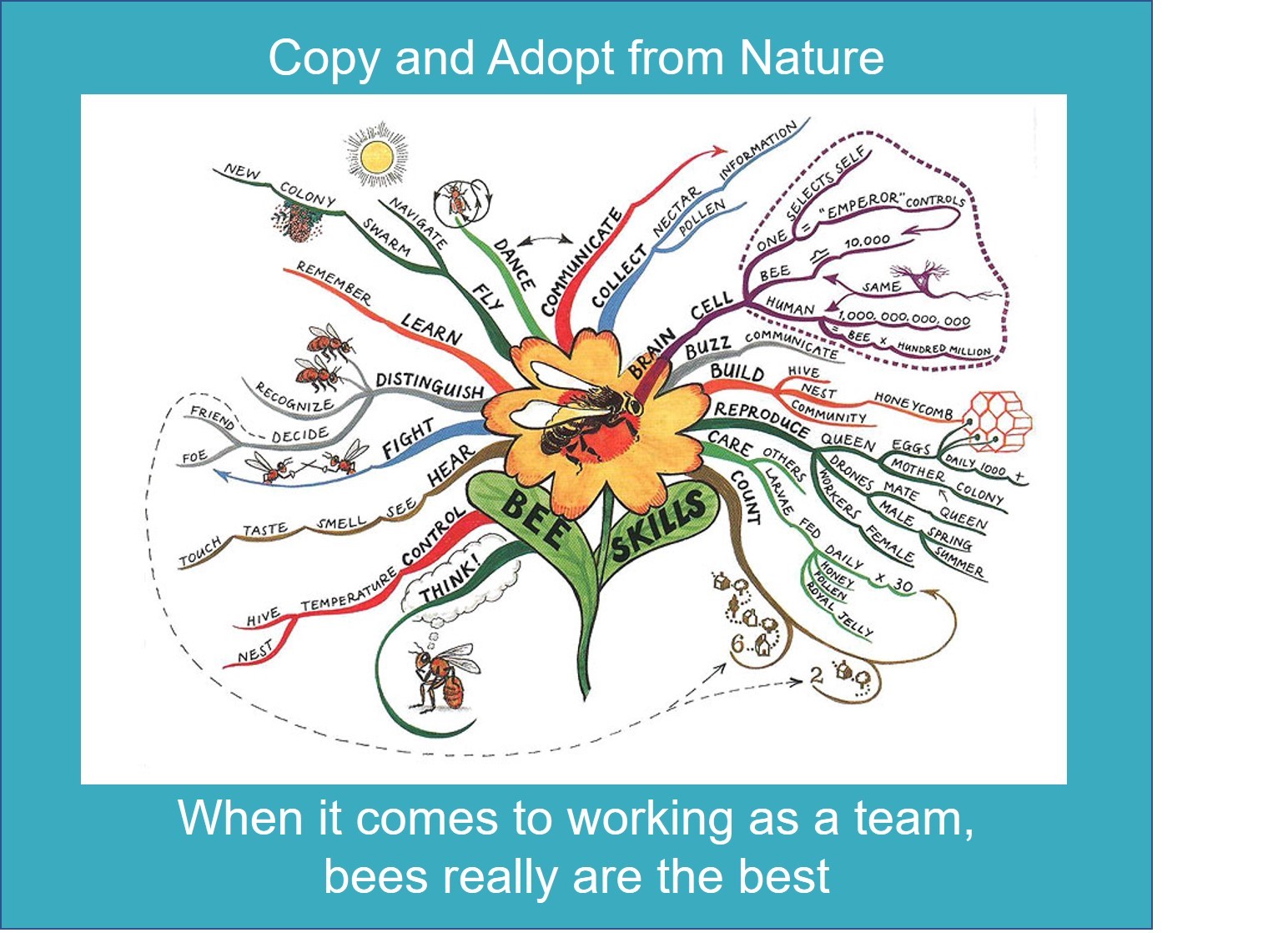Bees aren’t smart, bee colonies are. No single bee knows how to build a hive, protect the queen, and produce honey. But collectively, they still make it happen, which is quite impressive.
Here is how they do it:

-
One greater purpose: Bees have an absolute obsession with what is good for the whole colony over what is good for anyone bee. The whole hive’s vision, strategy and belief help define “true north” so every bee is committed to the greater purpose, direction and philosophy of surviving.
- Communication is the secret: The bee’s system of communication is capable of yielding an infinite number of different messages, like human language. Bees have achieved a spontaneous and constant form of communication. A truly inclusive communication and open sharing of information are at the heart of the team creating a unique and organic buzz.
-
No one is in charge: Bees are among nature’s most wondrous creatures. Colonies of these seemingly simple species have flourished for tens of millions of years without anyone in charge. They developed self-leadership a long time ago. The colonies successfully feed, fight, and reproduce, with each insect following simple rules, acting on local information.
-
It’s a complex adaptive system: The signal of any individual scout bee is “extremely noisy”. Only the aggregation of the individuals allows the colony to figure out what to do.
-
The Colony Culture: A strong colony culture of collaboration, cooperation and trust happens uniformly and automatically at every place within the hive. There is a belief that being “in colony” will produce something exceptional, far greater than doing it alone. The beehive honeycomb pattern exemplifies this concept of being interdependent and united.
-
Distributed authority: Decentralization is one of the hallmarks of the honeybee colony. Those closest to the information make the relevant decision. The information doesn’t travel up to the queen and back again. There is no ‘silo mentality’. This works well because: A) bees have clear objectives; B) they are excellent communicators and are able to quickly take in and consolidate information—and transform that information into coordinated action; and C) they are reliable workers that are very good at what they do.
-
Job rotation: Division of labor and thorough training can be highly efficient. As bees mature, they move through all the jobs in the hive before becoming food gatherers. This means that they all know how to perform a whole range of jobs and in an emergency situation can revert to former occupations to lend a hand. This is the key to enviable flexibility and adaptability.
- Swarm intelligence: Research has shown that bees can solve cognitive problems with an ability that far exceeds the cognitive ability of any single bee. That swarm intelligence is a means whereby a colony can overcome the cognitive limitations of its members. Wherever there is collective decision-making—for example, in democratic elections or organizations—there is a potential for swarm intelligence.
Ample ideas to learn from nature and replicate those skills in business. With the right mindset, approach, culture, leadership style, and the aid of technology this certainly can be done.
Imagine you are a business owner and your team had those skills. How easy would it be to align everybody with your vision and that common purposeful mission?
When looking for ways to improve your organization why not take a step back and ask yourself: “What would bees do?”

At Beekeeper, bees – nature’s most prolific pollinators - have become a beautiful inspiration to understand the power of internal communications.
Because when it comes to working as a team, studies show that bees really are the best.
With our platform’s features, you can emulate bees by harvesting swarm intelligence through using polls, sending clear, simple and engaging messages within group chats or newsfeeds. You choose to communicate via broadcasting or 'narrowcasting' to make your organization's WHY and its common goals clear to everyone!
Beekeeper exists because we believe people should be fully engaged at work and have all the tools they need to perform their jobs at the highest level.
We at Beekeeper want every single user to be-a-keeper and feel like a part of the hive.
Curious?
Bee brave and explore further how the Beekeeper platform could help you replicate those positive traits of bees in your organization for better business results.



